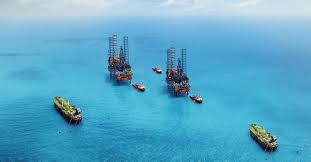Offshore oil and gas companies operate in a dynamic and challenging environment, where they must constantly navigate through price volatilit...
Offshore oil and gas companies operate in a dynamic and challenging environment, where they must constantly navigate through price volatility. gas and oil service companies In recent years, these companies have faced numerous challenges due to fluctuating oil and gas prices, which have impacted their profitability and growth prospects. This article will explore the specific challenges that offshore oil and gas companies are currently facing amidst price volatility, and the strategies they are implementing to mitigate these challenges.
Offshore oil and gas companies face numerous challenges amidst price volatility in the industry. The fluctuating prices of oil and gas can significantly impact the profitability of offshore operations. Companies must carefully major oil and gas companies navigate these price swings to ensure their continued success and stability in the market. In addition to price volatility, offshore oil and gas companies also encounter challenges related to operational costs, regulatory compliance, and technological advancements. These factors further contribute to the complexity of operating in the offshore environment. The need to invest in advanced technologies and adhere to stringent regulations adds to the financial burden on offshore oil and gas companies. Moreover, the remote and harsh offshore environment presents logistical and operational challenges that require specialized expertise and resources to overcome. Overall, offshore oil and gas companies must adapt to the ever-changing market conditions, improve operational efficiency, and invest in innovative solutions to thrive in the face of price volatility and other industry challenges.
The Environmental Impact of Offshore Oil and Gas Companies
oil and gas consulting company

Offshore oil and gas companies have a significant environmental impact due to their operations, including exploration, drilling, production, and decommissioning. One major concern is the potential for oil spills, which can result in extensive damage to marine ecosystems and coastal areas. Additionally, the discharge of drilling muds, produced water, and other waste materials can harm marine life and disrupt the balance of ocean ecosystems. The construction of offshore platforms and pipelines can also result in habitat destruction and disturbance to marine species. oil and gas field services companies Air pollution from flaring and other emissions is another issue, contributing to climate change and local air quality concerns. Overall, offshore oil and gas activities can have wide-ranging and long-lasting environmental impacts that need to be carefully managed and mitigated.
The Market Trends of Offshore Oil and Gas Companies

Offshore oil and gas companies have been facing a number of market trends in recent years. One major trend is the shift towards renewable energy sources, which has led to decreased investment in traditional oil and gas projects. Additionally, the increasing focus on environmental sustainability has resulted in stricter regulations and higher operating costs for offshore oil and gas companies. The fluctuating global oil prices and geopolitical tensions have also impacted the market trends for these companies, leading to uncertainty in their long-term viability. As a result, offshore oil and gas companies are facing significant challenges in adapting to these market trends and securing their future growth and profitability.
The Future of Offshore Oil and Gas Companies in a Changing Industry
The future of offshore oil and gas companies in a changing industry is uncertain as the sector is facing a number of challenges. These challenges include fluctuating oil prices, increasing competition from renewable energy sources, and a growing focus on environmental sustainability. Offshore oil and gas companies will need to innovate and adapt in order to remain competitive and ensure their long-term viability. This may involve investing in new technologies, exploring alternative energy sources, and implementing more sustainable practices. Additionally, companies may need to diversify their operations in order to reduce their reliance on traditional fossil fuels. Overall, the future of offshore oil and gas companies will depend on their ability to navigate these challenges and embrace the changes in the industry.
The Challenges and Opportunities for Offshore Oil and Gas Companies
The challenges for offshore oil and gas companies include navigating complex regulatory environments, managing significant operational and logistical hurdles, and mitigating environmental and safety risks. Additionally, fluctuating oil prices, geopolitical instability, and increasing competition pose significant challenges to the industry. However, offshore oil and gas companies also have various opportunities, including leveraging advanced technologies to improve operational efficiency, exploring new offshore drilling sites, and investing in renewable energy initiatives. Additionally, the growing global demand for energy presents opportunities for companies to expand their operations and pursue strategic partnerships. With proper planning and execution, offshore oil and gas companies can capitalize on these opportunities and navigate the challenges to achieve long-term success.
Innovation and Technology in Offshore Oil and Gas Companies
oil and gas operations consulting
Innovation and technology in offshore oil and gas companies play a crucial role in improving operational efficiency, safety, and environmental sustainability. Companies in this sector invest heavily in research and development to develop advanced drilling techniques, remote monitoring systems, and robotics for maintenance and inspection of offshore facilities. Additionally, advancements in seismic imaging technology and data analytics have greatly enhanced the ability to locate and extract oil and gas reserves from deepwater and challenging environments. The integration of digital technologies such as artificial intelligence, blockchain, and the Internet of Things also offers significant potential for optimizing offshore operations. Overall, innovation and technology are driving significant advancements in the offshore oil and gas industry, leading to improved productivity and reduced environmental impact.

